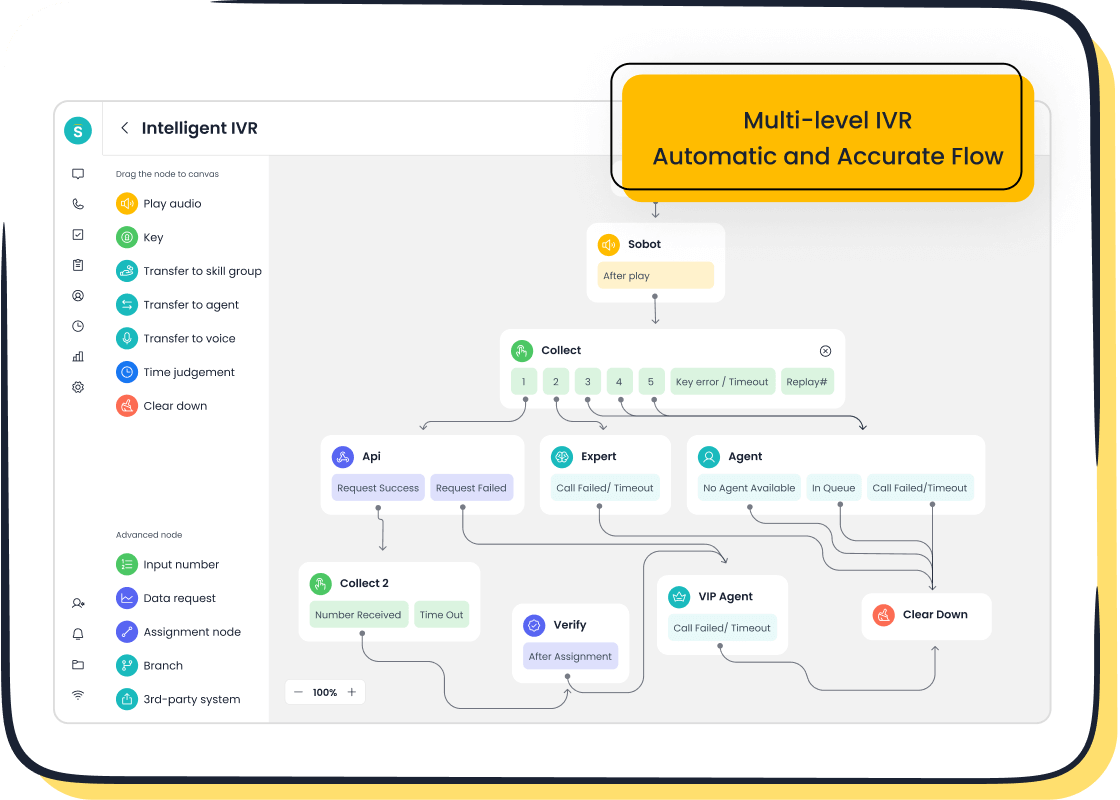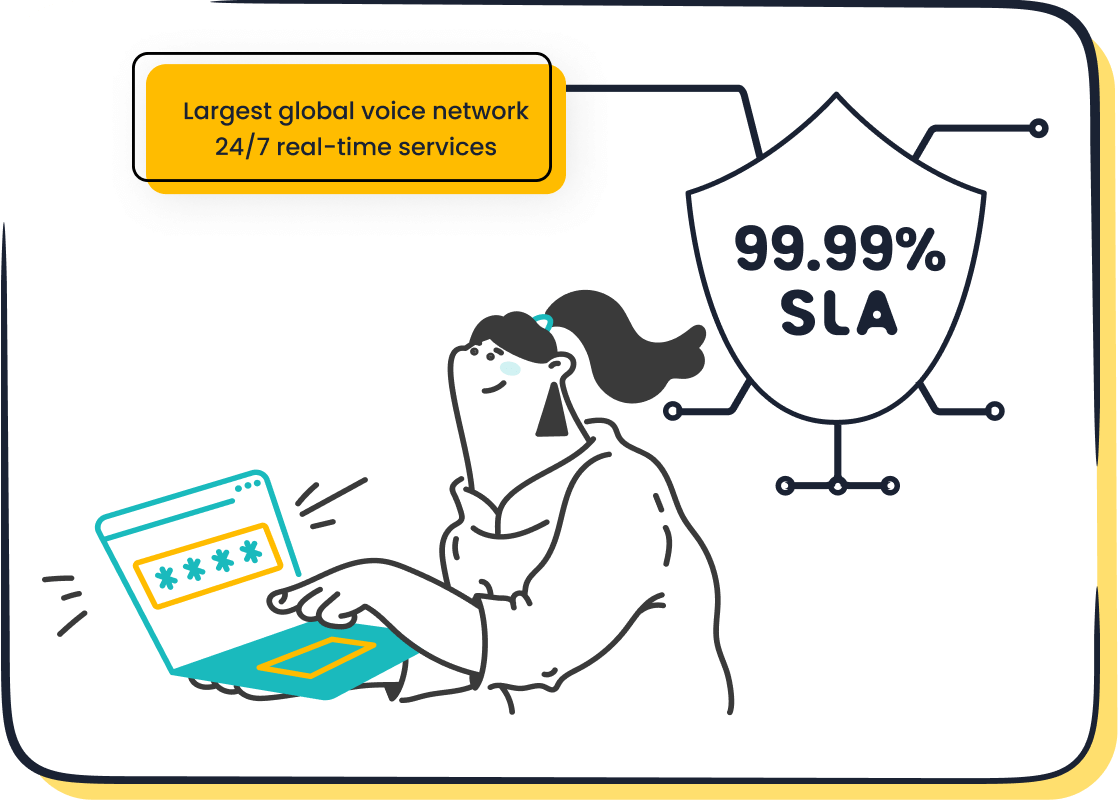A Guide to Online Customer Service Scripting

Online customer service scripting plays a vital role in shaping how customers perceive your brand. It ensures consistent communication, which builds trust and improves operational efficiency. Studies reveal that 73% of customers prefer personalized experiences, while 65% switch brands due to poor service. Scripts help businesses meet these expectations by guiding agents to deliver empathetic and accurate responses.

Without effective scripting, agents may sound robotic or fail to address unique issues, leading to missed opportunities for building relationships. Sobot’s Voice/Call Center offers tools like intelligent IVR and real-time monitoring to create adaptable scripts. These features empower your team to provide seamless support, enhancing customer experience and loyalty.
Understanding Online Customer Service Scripting
What Is Online Customer Service Scripting?
Definition and Purpose
Online customer service scripting refers to pre-designed conversational frameworks that guide agents during interactions with customers. These scripts aim to ensure clarity, empathy, and actionability in every conversation. Unlike traditional call center scripts, which often follow rigid structures, online scripts prioritize adaptability and personalization. For example, a script for handling billing inquiries might include empathetic phrases like, "I understand how frustrating this can be," followed by clear steps to resolve the issue.
The core components of effective customer service scripts include:
- Clarity: Avoid jargon to make the script easy to follow.
- Flexibility: Allow agents to adapt based on the situation.
- Empathy: Use language that builds trust and rapport.
- Actionability: Provide clear next steps to guide the conversation.
These elements ensure that your customer service teams can handle customer queries efficiently while maintaining a human touch.

How It Differs from Traditional Call Center Scripts
Traditional call center scripts often rely on rigid, one-size-fits-all approaches. They focus on standardizing responses, which can make agents sound robotic. In contrast, online customer service scripting emphasizes adaptability. For instance, Sobot’s Voice/Call Center enables agents to personalize interactions using real-time customer data. This approach not only improves customer service communication but also enhances the overall experience by addressing unique needs.
Why Online Customer Service Scripting Matters

Ensuring Consistency Across Channels
Consistency is crucial for building trust. Online customer service scripting ensures that your brand voice remains uniform across all channels, whether it’s phone, email, or live chat. For example, Sobot’s unified workspace consolidates customer data, enabling agents to deliver consistent responses regardless of the platform. This consistency reassures customers and strengthens your brand identity.
Supporting Agents in Complex Scenarios
Handling complex customer queries can be challenging, especially for new agents. Online scripts provide structured guidance, reducing errors and ensuring a uniform approach. They also allow room for empathy and personalization, which are essential for resolving intricate issues. For instance, Sobot’s AI-powered Voicebot assists agents by recognizing customer intent and suggesting appropriate responses. This support empowers your customer service teams to handle even the most demanding situations with confidence.
Key Benefits of Effective Call Center Scripts
Enhancing Customer Experience

Faster and More Accurate Responses
Effective call center scripts streamline communication, enabling call center agents to deliver faster and more accurate responses. Predefined steps in scripts reduce the time spent searching for information, allowing agents to resolve issues promptly. For example, Sobot’s Voice/Call Center equips agents with a unified workspace that consolidates customer data, ensuring quick access to relevant details. This efficiency not only improves call center efficiency but also enhances customer satisfaction by addressing concerns during the first interaction.
| Improvement Type | Description |
|---|---|
| Consistency in Interactions | Ensures all customers receive the same information and assistance, leading to a uniform experience. |
| Improved First-Call Resolution Rates | Helps solve customer issues during the first interaction, enhancing satisfaction. |
| Streamlined Communication | Facilitates clear and quick delivery of information to customers. |
Building Trust Through Consistency
Consistency in communication builds trust with your customers. Call center scripts ensure that agents provide uniform responses across all interactions, reinforcing your brand’s reliability. Training agents to express empathy and actively listen further strengthens these connections. For instance, Sobot’s intelligent IVR system helps maintain consistent communication across channels, ensuring a seamless experience for customers. This approach minimizes errors and fosters loyalty by creating a dependable brand image.
Empowering Agents with Confidence
Reducing Stress for New Agents
Call center scripts act as a safety net for new agents, reducing stress and boosting confidence. They provide a clear roadmap for handling calls, ensuring that agents feel prepared even in challenging situations. Scripts also shorten training time by offering a structured framework for learning. Sobot’s AI-powered Voicebot supports agents by recognizing customer intent and suggesting appropriate responses, making it easier for new hires to adapt quickly.
Providing Clear Guidance During Calls
Scripts empower agents by offering clear guidance during interactions. They help keep conversations on track and ensure that essential information is communicated effectively. For example, Sobot’s real-time monitoring tools allow supervisors to provide instant feedback, further enhancing agent performance. This structured support enables agents to handle diverse customer inquiries with confidence, improving both call center efficiency and customer satisfaction.
Ensuring Compliance and Brand Alignment
Meeting Legal and Regulatory Standards

Call center scripts help businesses comply with legal and regulatory standards by ensuring accurate disclosures and proper handling of sensitive information. For instance, scripts can guide agents in adhering to regulations like HIPAA for patient data or PCI DSS for payment security. Sobot’s Voice/Call Center simplifies compliance by integrating these guidelines into its system, reducing legal risks.
| Regulation Name | Description |
|---|---|
| HIPAA | Protects patient health information. |
| PCI DSS | Ensures secure handling of payment information. |
| TCPA | Regulates telemarketing calls. |
Maintaining a Unified Brand Voice
Effective call center scripts align agent communication with your company’s brand voice. They ensure that agents use language and tone consistent with your values, creating a cohesive customer experience. Sobot’s solutions allow you to review and refine scripts regularly, ensuring they reflect your brand’s evolving identity. This alignment reinforces your company’s values and enhances brand recognition among customers.
Best Practices for Crafting Effective Call Scripts
Prioritize Flexibility and Adaptability
Avoid Robotic Language
A rigid script can make your agents sound robotic, which may alienate customers. Instead, focus on creating a conversational tone that feels natural. For example, a welcoming greeting like, "Thank you for calling [Company Name], where [Company Value]. My name is [Agent Name], and I'm happy to assist you today," sets a friendly tone. Sobot’s Voice/Call Center supports this approach by enabling agents to access real-time customer data, helping them adapt their responses dynamically. This flexibility ensures that your call center scripts resonate with customers and foster meaningful interactions.
Allow Room for Personalization
Personalization is key to building strong customer relationships. A well-structured script should guide agents while allowing them to tailor responses based on individual needs. For instance, phrases like, "I understand you're looking for [Product/Service]. Could you tell me more about what you're hoping to achieve?" encourage active listening and personalized recommendations. Designing call center scripts with adaptability in mind ensures agents can address unique concerns effectively, enhancing customer satisfaction.
Use Customer-Centric Language
Incorporate Empathy and Positive Phrasing
Empathy and positivity can transform a challenging conversation into a productive one. Use phrases like, "I’m sorry to hear that. How can I help?" or "We’re here to help you troubleshoot this issue! Here are three easy steps you can try right now." These examples show customers that you value their concerns and are committed to resolving them. Sobot’s AI-powered Voicebot can assist agents by suggesting empathetic responses, ensuring every interaction feels genuine and supportive.
Avoid Jargon and Complex Terms
Clear communication is essential for effective call center scripts. Avoid using industry jargon or overly technical language that might confuse customers. Instead, opt for simple terms that anyone can understand. This approach not only improves comprehension but also boosts customer satisfaction scores by 25%, as shown in recent studies. A customer-centric script ensures a consistent experience for all customers, regardless of their familiarity with your industry.
Regularly Test and Refine Scripts
Gather Feedback from Agents and Customers
Continuous improvement is vital for maintaining effective call center scripts. Use post-interaction surveys to gather customer feedback and conduct regular reviews with agents to identify areas for improvement. For example, ask customers how well the script addressed their concerns or encourage agents to share their experiences using the script. These insights help you refine your scripts to better meet customer needs.
Leverage Insights from Sobot's Voice/Call Center Analytics
Sobot’s Voice/Call Center provides real-time analytics that can help you evaluate script performance. By analyzing call data, you can identify trends and adjust your scripts accordingly. For instance, if data shows frequent customer confusion about a specific process, you can revise the script to clarify that section. This data-driven approach ensures your scripts remain relevant and effective over time.
Examples of Effective Call Center Scripts
Common Scenarios in Customer Service
Example for Billing Inquiries
Billing inquiries are among the most frequent customer service scenarios. An effective call script for this situation should prioritize clarity and empathy. For instance, you might start with, "I understand billing issues can be frustrating. Let me help you resolve this quickly." Then, guide the customer through the resolution process step-by-step. Sobot’s Voice/Call Center simplifies this by providing agents with a unified workspace that consolidates billing data, ensuring faster and more accurate responses. Over 90% of customers appreciate personalized service, and flexible scripts allow agents to adapt to unexpected questions, enhancing satisfaction.
Example for Product Troubleshooting
When customers face technical issues, they expect clear and actionable guidance. A troubleshooting script might begin with, "I’m sorry to hear you’re experiencing this issue. Let’s work together to fix it." Follow this with specific steps tailored to the product. Sobot’s AI-powered Voicebot can assist by recognizing customer intent and suggesting solutions in real time. Regular updates to scripts ensure they remain relevant, improving customer care and first-call resolution rates.
Managing Challenging Conversations
Example for Handling Angry Customers
Dealing with angry customers requires a script that balances empathy and actionability. Start with, "I understand how upsetting this must be. Let’s find a solution together." Then, focus on resolving the issue while maintaining a calm tone. The table below highlights key elements of such scripts:
| Key Element | Description |
|---|---|
| Clarity | Scripts should be easy to understand and free of jargon. |
| Flexibility | Agents need room to adapt their approach to fit the conversation. |
| Empathy | Scripts should include empathetic language that builds trust and rapport. |
| Actionability | Every script should include clear next steps to guide the conversation. |
Sobot’s real-time monitoring tools allow supervisors to provide instant feedback, helping agents handle these situations effectively.
Example for Offering Refunds or Compensation
Refunds or compensation requests can be sensitive. A well-crafted script might say, "We’re sorry for the inconvenience. To make this right, we’d like to offer you [specific compensation]." This approach demonstrates accountability and builds trust. Sobot’s intelligent IVR system ensures agents have access to customer history, enabling personalized resolutions.
Driving Sales Through Scripts
Example for Upselling Additional Products
Upselling scripts work best when they align with customer needs. For example, "You recently purchased [product]. Many customers also find [related product] helpful. Would you like to learn more?" This approach feels natural and customer-focused. Sobot’s Voice/Call Center supports upselling by providing agents with real-time customer insights, ensuring personalized recommendations.
Example for Cross-Selling Related Services
Cross-selling involves suggesting complementary services. A script might say, "We noticed you’re using [service]. Did you know we offer [related service] that could enhance your experience?" This strategy not only boosts sales but also improves customer satisfaction. The table below provides examples:
| Script Example | Purpose |
|---|---|
| Hey, {first-name}. You recently checked one of our products. What do you think about these options? | Engage customer with product suggestions |
| We’re glad to see that you’ve purchased {first-name}. A lot of our customers buy ancillary products. Are you interested in testing some of them? | Suggest complementary products to enhance purchase |
Sobot’s analytics tools help refine these scripts, ensuring they remain effective over time.
Training Agents to Use Call Center Scripts Effectively
Role-Playing and Practice Sessions
Simulating Real-Life Scenarios

Role-playing is an essential tool for training agents to use call center scripts effectively. By simulating real-life scenarios, you can prepare your team for a variety of customer interactions. For example, agents can practice handling situations like identifying hazards in packages, troubleshooting contaminated vehicles, or resolving billing queries. These exercises help agents develop problem-solving skills and build confidence in using scripts. Sobot’s Voice/Call Center supports these training purposes by providing tools like call recordings and real-time analytics, which allow you to replicate real-world challenges during training sessions.
Encouraging Feedback and Iterative Improvement
Encouraging feedback during role-playing sessions ensures continuous improvement. Ask agents to share their experiences and identify areas where they feel uncertain. Use this feedback to refine scripts and enhance training materials. A structured approach to feedback fosters active listening and improves communication skills. The table below highlights the benefits of role-playing for agent performance:
| Benefit Description |
|---|
| Role-playing helps you become more comfortable with the script, allowing you to deliver it with confidence and ease when it really matters. |
| Role-playing allows you to practice handling objections in a low-pressure environment, so you’ll be better prepared to handle them when they arise in real life. |
| Role-playing helps you become a better communicator by improving listening skills, reading body language, and conveying messages effectively. |
| Role-playing ensures that you deliver your message consistently every time. |
Balancing Script Use with Personalization
Empowering Agents to Adapt Scripts
Scripts should serve as guidelines, not rigid rules. Empower your agents to adapt scripts based on customer needs. For instance, agents can personalize language to reflect specific customer issues or prepare for unexpected queries by researching common pain points. This flexibility enhances agent performance and ensures authentic interactions. As one expert puts it, > "Scripts are guidelines, not handcuffs. Empower your agents to use them as springboards for authentic, effective communication."
Encouraging Authentic Interactions
Authenticity builds trust. Encourage agents to use empathy and active listening to connect with customers. For example, instead of sticking to a generic script, agents can say, "I understand how this issue affects you. Let’s find a solution together." Research shows that companies prioritizing personalization are twice as likely to achieve revenue growth of 20% or more. Sobot’s Voice/Call Center equips agents with real-time customer data, enabling them to tailor interactions while maintaining script consistency.
Leveraging Sobot's Voice/Call Center for Training
Using Call Recordings for Coaching
Call recordings are invaluable for training and onboarding. Use them to review agent performance and identify areas for improvement. For example, analyze how agents handle complex queries or respond to objections. Sobot’s Voice/Call Center offers advanced call tracking and recording features, making it easier to provide targeted coaching. This approach not only enhances communication skills but also ensures agents are well-prepared for real-world scenarios.
Monitoring Performance with Real-Time Analytics
Real-time analytics provide actionable insights into agent performance. Use these tools to monitor how effectively agents follow scripts and adapt to customer needs. Sobot’s Voice/Call Center includes real-time monitoring features that allow supervisors to track key metrics like response time and resolution rates. These insights help you refine training programs and improve overall agent performance, ensuring your team consistently delivers exceptional service.
Technologies for Optimizing Call Center Scripts
Sobot's Voice/Call Center Features
Intelligent IVR and Smart Call Routing
Intelligent IVR scripts are essential for streamlining customer interactions. They guide callers through automated menus, ensuring they reach the right department or agent. Sobot's Voice/Call Center enhances this process with a drag-and-drop interface, allowing you to customize greetings and workflows in real time. Smart call routing further optimizes efficiency by directing calls based on customer needs, agent skills, or time zones. This ensures that every interaction is handled by the most suitable agent, reducing wait times and improving satisfaction. With these features, your call center software becomes a powerful tool for delivering seamless support.
Real-Time Monitoring and Analysis
Real-time monitoring tools provide valuable insights into agent performance and customer interactions. Sobot's Voice/Call Center offers advanced analytics that track key metrics like call duration and resolution rates. Supervisors can use this data to identify trends, address issues, and refine ivr scripts. For example, if a specific script leads to longer handle times, you can adjust it to improve efficiency. This proactive approach ensures your call center technology remains effective and adaptable.
AI and Machine Learning in Script Development
Automating Script Updates Based on Trends
AI and machine learning simplify the process of updating call center scripts. These technologies analyze customer interactions to identify patterns and suggest improvements. For instance, libraries like Brain.js and TensorFlow.js allow developers to create neural networks that predict customer needs. This automation ensures your scripts stay relevant, reducing the time spent on manual updates. By leveraging AI, you can enhance your call center software's adaptability and maintain high service standards.
Analyzing Customer Data for Insights
Machine learning tools like ml5.js make it easier to analyze customer data and extract actionable insights. These insights help you understand common pain points and refine ivr scripts accordingly. For example, if data shows frequent confusion about a billing process, you can adjust the script to provide clearer instructions. This data-driven approach not only improves customer satisfaction but also boosts the efficiency of your call center technology.
| Library | Description | Example Code |
|---|---|---|
| Brain.js | Simplifies understanding of Neural Networks by hiding complex mathematics. | const net = new brain.NeuralNetwork(); |
| ml5.js | Aims to make machine learning accessible with simple code. | const classifier = ml5.imageClassifier('MobileNet'); |
| TensorFlow.js | Allows users to create and visualize Neural Networks in the browser. | const model = tf.sequential(); |
Tools for Measuring Script Effectiveness
Tracking Key Performance Metrics
Measuring the success of ivr scripts requires tracking key performance metrics. Tools like speech analytics and call recording software provide quantitative data on script effectiveness. For example, you can monitor average handle time or first-call resolution rates to evaluate performance. Sobot's Voice/Call Center includes these features, enabling you to make data-driven decisions that enhance your call center software's efficiency.
Using Customer Feedback for Continuous Improvement
Customer feedback is invaluable for refining call center scripts. Surveys and feedback tools help you understand how well your scripts address customer needs. For instance, if customers frequently mention unclear instructions, you can revise the script to improve clarity. A/B testing further allows you to compare different versions of scripts and identify the most effective one. This iterative process ensures your ivr scripts evolve to meet customer expectations.
| Tool/Method | Purpose |
|---|---|
| Speech Analytics | Provides real-time insights into customer interactions. |
| Call Recording Software | Helps identify common issues and areas for improvement. |
| Customer Feedback Tools | Collects feedback through surveys to understand customer perspectives. |
| Performance Metrics | Offers quantitative data on script effectiveness (e.g., handle time). |
| A/B Testing | Allows for data-driven optimization of scripts. |
Online customer service scripting plays a critical role in improving customer interactions and operational efficiency. It ensures consistency, empowers agents, and enhances customer satisfaction. For example, businesses using effective scripts often see a 25% boost in first-call resolution rates, which directly impacts customer loyalty.
You can implement the strategies discussed in this guide to optimize your operations. Tools like Sobot’s Voice/Call Center provide intelligent IVR, real-time analytics, and AI-powered features to refine your scripts and deliver exceptional service. Continuous improvement and technology adoption will help you maintain effective scripts that adapt to evolving customer needs.
Ready to transform your customer service? Explore Sobot’s solutions today!
FAQ
What is the purpose of a sales call script?
A sales call script provides a structured framework for guiding customer interactions. It ensures agents deliver consistent, accurate, and empathetic responses. This tool helps you address customer needs effectively while maintaining your brand voice. For example, scripts can improve first-call resolution rates by up to 25%.
How can you make a sales call script more effective?
Focus on clarity, flexibility, and personalization. Avoid robotic language and include empathetic phrases. Use tools like Sobot’s Voice/Call Center to access real-time customer data. This approach ensures your scripts adapt to unique customer interactions, improving satisfaction and loyalty.
Why is consistency important in customer interactions?
Consistency builds trust and strengthens your brand identity. A unified approach ensures customers receive the same quality of service across all channels. Sobot’s unified workspace consolidates customer data, enabling agents to deliver consistent responses during every interaction.
How does technology enhance sales call scripts?
Technology like AI and real-time analytics optimizes scripts by analyzing trends and customer data. Sobot’s Voice/Call Center uses intelligent IVR and smart call routing to streamline customer interactions. These features ensure your scripts remain relevant and effective over time.
What role does feedback play in improving scripts?
Feedback from agents and customers helps refine scripts. Post-interaction surveys and real-time analytics identify areas for improvement. For instance, Sobot’s call tracking tools provide insights into customer interactions, enabling you to adjust scripts for better outcomes.
See Also
Excelling in Live Chat for Effective Customer Assistance
Enhance SaaS Customer Support Using Live Chat Techniques
Ten Guidelines for Selecting Social Media Support Tools
Ways AI Customer Support Tools Improve Operational Efficiency